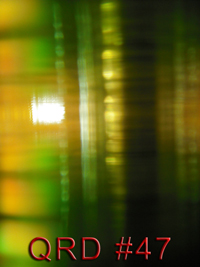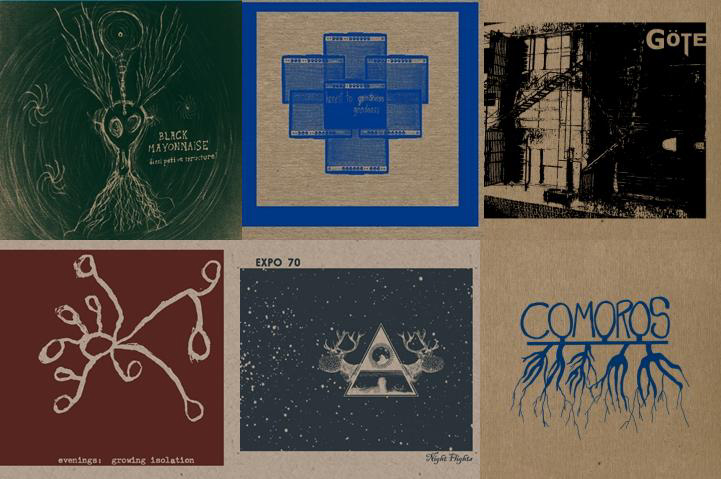




















January 2011

Label: Fedora Corpse Recordings
City: Philadelphia, Pennsylvania
Artists: Comoros, Göte, Expo ‘70, Evenings, Black Mayonnaise, Honest to Goodness,
Website: www.fedoracorpse.com
QRD – When & why did you start your label?
Jennifer – We started as a netlabel in 2005. After taking a web design class I thought it would be a decent way to use what I learned. Our first LP came in 2008 because we realized netlabels would never be taken seriously. Plus, our first LPs were our own bands, so there’s a little bit of vanity there too.
QRD – How many releases have you put out?
Adam & Jennifer – 6 LPs, one 7”, a bunch of CDRs & various assorted sundries.
QRD – What are the fun &/or rewarding parts about running a label?
Adam – For us, the best times are when things start showing up at our house. You get the test presses & it’s an excuse to have a little listening party. That & the assembly stuff. We spend lots of time putting everything together, stamping the record labels & assembling the product. It’s a great activity for us, just to hang out & play with big boxes of records all day.
QRD – What do you feel is the biggest waste of your time running the label?
Adam & Jennifer – Post office lines!!!
QRD – What are some labels you admire or feel a kinship to?
Adam – Labels that have an aesthetic or even a consistent design concept are the ones that have always had that special appeal, to make you want to collect them or at least easily identify them. For example: PSF, Constellation Records, aRCHIVE cd, Heavy Tapes, etc. Kinship is a different question. For that I’d have to list other labels that are trying to have a good time & not take themselves too seriously: At War With False Noise, RRR, Vendetta, Troniks, Not Not Fun, & Tequila Sunrise.
QRD – What makes your label special & unique?
Jennifer – I think we’re probably the only ones that have every release only on colored vinyl with screenprinted raw kraft covers. Aside from that, maybe not that much.
QRD – How has your physical location affected your label?
Jennifer – There are some very enthusiastic people running labels in Philly, which helps spur us on to make more records. Plus, it helps that you can have people stop by your house, play music with you, & take some records home with them when they leave. We do a lot of local trading & have only once had to go more than a mile to play a gig.
QRD – How do most fans find out about your label?
Adam – To be perfectly honest, I’m not really sure. We’ve been fortunate to get some nice reviews in print & online, but I’m not convinced that either of those things have ever lead to any additional sales or increased website traffic. Maybe this interview will help?
QRD – What’s been your biggest selling release & why do you think it was?
Adam & Jennifer – Expo 70 – Night Flights was our quickest seller, probably because we were putting out his 1st full-length vinyl release when he already had a loyal following.
QRD – What are some things that make you want to work with a band?
Adam & Jennifer – So far, we have only worked with “one-man bands”. It is so much easier to communicate ideas this way & avoid things like ‘“voting” on small decisions. Having already released great material is essential. We listen to these projects & say, “there should really be MORE of this”!
QRD – How involved do you like to be in the artwork design for a release?
Adam – We love the art & design aspects of a release & will always pick up where the artist leaves off. In other words, it depends on how concrete their ideas are. If we get a set of images & instructions, we happily work with those, but a lot of times I end up doing layout work or changing certain aspects to fit the requirements. It tends to become collaborative in the end & I’m grateful when some of my art ends up on the final product.
QRD – How long is it from when an artist delivers an album to you until release date & why?
Jennifer – We try to be quick about things, taking maybe 1-2 months to get everything together. Our runs are small, which helps, & we make sure to have everything lined up before we get an album. Having a short gestation keeps momentum going, so the artists & us can all be excited about the project the whole way though. We get impatient.
QRD – If you really like a band, but aren’t sure you could sell many copies of their record; what do you do?
Adam & Jennifer – Make it anyway & clear out space in a closet.
QRD – How do you split profits from a release between artists & your label?
Adam & Jennifer – The artist gets 1/3 of the run.
QRD – Do you have written contracts with your bands or handshake deals?
Adam & Jennifer – No contracts.
QRD – How important is it to you to have touring acts on your roster & what do you do to encourage it?
Adam – It is incredibly helpful if the band plays out. That is the main thing that moves records. That being said, we don’t play out much ourselves & have never toured, so we can’t really bug anybody else about getting out there. If someone has shows lined up, we try to make sure they have enough merchandise to carry around with them. Of course, if they come play Philly, they get free dinner & a place to crash.
QRD – How do you decide how big the initial pressing of a release should be?
Adam & Jennifer – We see what the price breaks on the pressing look like & then think about how many we think we can handle. We do all the assembly, some artwork by hand, & all of the shipping, so we need to keep it small.
QRD – What percentage of a pressing do you use for promotions?
Adam & Jennifer – 10%
QRD – Do you sell merchandise other than the music (t-shirts, etc.)?
Adam & Jennifer – Not yet. We’ve made lots of stickers & buttons & things to give away for free. We get a kick out of it, so there could be more of that sort of thing in the future.
QRD – Do you sell music that is not on your label?
Adam & Jennifer – Nope.
QRD – How has running a label effected your own artistic career?
Adam – The idea was that we’d put some of our best music on vinyl, hoping that the format would legitimize the content & then our band would get more gigs, release more albums on other labels, & so on. To some extent that has actually been the case, but in the process we’ve learned to treat the making of records as an artform of its own, adding to our creativity in general. Pushing an idea through the entire process (recording it ourselves, releasing it ourselves) is a perfectly satisfying experience.
QRD – Ideally, would you release your own material?
Jennifer – Not exclusively. We began by releasing our own material, so I see no reason to stop now.
QRD – Do you think the album format is dead?
Adam – Not a chance. As long as musicians keep thinking about the canonical works as albums, they will probably continue to create their own works in a similar form. It’s the standard. I hardly remember the names of individual tracks that I listen to, just the band & the album title. That’s the point of reference.
QRD – Do you think the return of vinyl & cassettes is a fad?
Adam & Jennifer – We truly hope not.
QRD – Is it important to have physical releases over digital ones or does it not matter?
Adam & Jennifer – We have tried both. These days we wouldn’t even consider an exclusively digital release. That’s not to say that it’s “important”, just what we’ve come to prefer. The physicality of the release is actually the most gratifying part for us.
QRD – What do you think of ultra-limited runs of releases (less than 100 discs)?
Jennifer – Limited runs are great as long as there isn’t a huge demand for the album. You don’t want to cause scarcity & the related price inflation. It can anger your fans & ruin the label’s credibility. Personally, I like having rare records & tapes, but I also don’t pay collectors prices for them. It’s a delicate balance.
QRD – What changes in things would cause you to stop your label?
Adam & Jennifer – We keep saying that we’re going to stop the label. There are plenty of reasons why we should. But it’s fun & we don’t feel like shopping around for a new hobby. The only thing that would kill it for sure is if we stop liking music. You know, if we get too cynical & start hating everything… we’ve seen good labels end that way.
QRD – What would you suggest to someone starting a label today?
Adam & Jennifer – Never expect to make your money back. It’s an expensive hobby, but it’s a lot better than scuba diving.
QRD – Why do you think labels are still important to artists?
Adam & Jennifer – When someone else is willing to invest time & money in your art, your work is validated & that support can mean so very much. It’s one thing to compliment a person’s playing, but it’s amazing to hear that somebody wants to help you create something new.
QRD – In 20 years what do you think/hope your label will be known/remembered for?
Adam – Consistency. I think it would be fantastic if we could avoid having albums that are exceptions in the minds of the people that like our releases. So many labels I like have those stains in their catalogs, & then you have to qualify your interest in them, saying “Yeah, I like that label… except.” Let’s just hope we don’t make one of those.
Jennifer – My greatest hope would be for
people to be able to look back at Fedora Corpse & remember us as a
label that put out first, obscure records for artists that went on to have
long, fruitful careers. I’d love to be the person who gave people that
chance.







